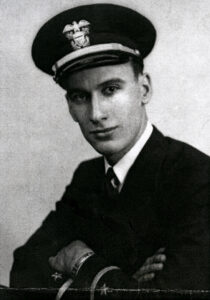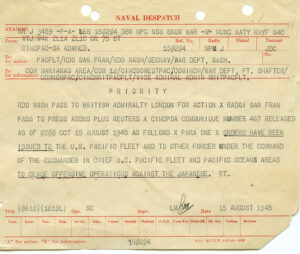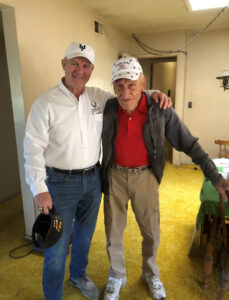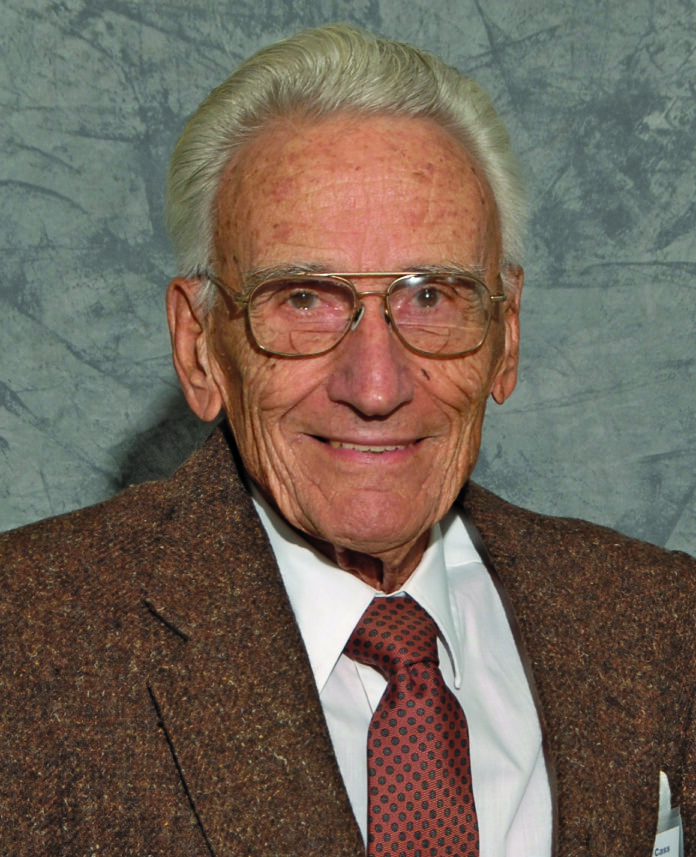Born a preacher’s son in northwestern Iowa, the remarkable life of William Foster Cass is a living embodiment of the traditional American dream.
As he looks back on his long life, it is obvious how fate has smiled favorably upon this self-made Los Alamitos resident, who celebrated his 103rd birthday Sunday.
Cass has worked his way through college, became an educator, then an educational administrator, raised a family, and witnessed history as a Naval officer along the way.
His first glance from lady fate occurred when his dad, Rev. Frank W. Cass and mom, Carrie Jackley Cass, uprooted the family from northwestern Iowa and found a little house to rent in the tiny town of Fayette.
“My dad took a sabbatical, and we rented a home in Fayette. He “did whatever he could” to make sure the family was able to get established,” says Cass in an oral history recording provided to ENE by Upper Iowa University.
As it turns out, the home they rented was on Union Street, literally across the street from Upper Iowa University (UIU), a small private college founded in 1857.
Soon thereafter, in 1937, Cass not only enrolled in UIU, but landed a job as a janitor making 20 cents per hour which was enough to pay for his tuition and books.
“I was lucky,” said Cass, “because they gave ministers’ kids half tuition.” Therefore, that 20-cents an hour was applied by the university to his tuition so “I was able to work it all out.”
In fact, he recalled, “I don’t remember paying Upper Iowa anything.” In those days, said Cass, the professors made $135 per month. “That’s just the way it was in the 1930’s.” said Cass.
In the oral history, recorded five years ago, Cass was both ebullient and sharp. Even seven decades after college, he smiles heartily recalling his little campus job in which he remembers proudly, and fondly, till this day.
“My dad was working for a college in Pennsylvania, and they furnished him a car…well, his old car was here. I could drive it. Had a license. I had keys to my dad’s car but didn’t have the money to buy gas.”
“In those days, you generally got around by hitchhiking,” he said.
“I’m not sure this should all be on the record,” says Cass in the recorded history, but quickly smiles and proceeds to tell the story about the time the school paid for gasoline so he and five friends could use his dad’s car for a college outing in the late 1930’s.
“We were going on a bus tour with the choir,” said Cass. “Well, there was not enough room for everyone on the bus and Cass said the Choir Director wanted someone to drive a car,” said Cass.
“I’ll drive if you buy the gas,” he volunteered, and Cass said “so five guys and myself rode in that old 39 Nag.” “We would go ahead of the bus and get a drink and let the bus catch up with us,” he says with the glee. “We did everything they didn’t want us to do. Those were fun days.”
It was on the UIU campus where Cass met his wife, Maxine Marion Duff. It happened in the university’s library, then named the David B. Henderson Library, which happened to be the first Carnegie academic library in the country, according to the university.
He remembers the day he met her very well, picking up the story as he approached the library’s huge stairway.
“There were three girls standing up there, looking down, and I heard, you know, they were kind of giggling, so I looked up and thought I knew them.”
“I started up the stairs, joking with them. Then I realized it was three young ladies that just came on campus, and I didn’t know them at all,” sheepishly remembers Cass.
“So, I apologized, and they laughed. But I started talking to one of them (Maxine) and we dated.”
Cass slowly became well known on campus. He played football for the legendary football coach Doc Dorman (“I scored one touchdown.”), sang in the choir, wrote poetry and Foster joined the Pi Rho Zeta national honorary fraternity.
In 1941, Cass graduated from the Upper Iowa University, with a double major in business administration and math. He had a minor in history. War, nevertheless, was looking more likely and Congress had passed the Selected Service Act the year before, so Cass wasted no time.
“By my junior year, the clouds of war were forming, and I knew I wanted a degree,” says Cass. “I didn’t want to be a foot soldier, I wanted to be a Navy officer.” Not waiting to be drafted, almost immediately
After graduating, Cass said he took a bus immediately to the nearest Navy recruiting office and enlisted. “I had my degree,” said Cass, figuring that would “qualify me as a candidate for officer training in the Navy.”

Courtesy photo
He was enrolled in Officer Training School and became a commissioned officer “about the time of Pearl Harbor,” after which President Roosevelt entered the U.S. in World War II, and after a brief station aboard the USS Lakehurst, he was assigned to serve aboard the USS Fayette, an attack transport named for his hometown.
He was still dating Maxine and wanted to marry her, so Cass quickly devised a plan.
Although Cass logged “more 100,000 miles on the ocean” during WWII, he managed to marry Maxine.
In January 1943, when he knew the ship scheduled a stopover in Chicago, he made it happen. Maxine, who had just turned 18, took a train to Chicago to meet Foster, he says in the oral history.
They met at a hotel, got a marriage license and then “took the nickel subway” up to the Madison Ave. Presbyterian Church.
“We found a minister and I said will you marry us, we got a license,” asked Cass? He (minister) looked at the license, paused, then said, yes, he would marry us.”
“Then,” said Cass, “the minister looked at us and said where’s your witness?”
Witness? “We had no gowns, no flowers, no nothing.”
Cass said the minister retreated into the church and finds a “gal” attending choir practice at the church and convinces her to become the witness to their wedding.
“We just wanted to be married,” said Cass.
“We were married, went back to the hotel for two days,” says Cass, then laughs. “Our daughter Ann was born nine months later. “It was quite a story,” he says with a smile.
Cass served five years during WWII as a commissioned officer ended up aboard the USS Ormsby, where he served as a communications officer and had the honor to receive and read the telegram officially ending the war to his shipmates.

The WWII vet still has a copy of that fateful telegram and Cass is today listed in the U.S. Navy Memorial.
Cass returned to Iowa after the war where he and Maxine settled down and had a family. “For the nine years before our kids were all in school, Maxine played the important role of homemaker and wife,” wrote Cass in an essay published about Maxine.
Cass began teaching while eventually, Maxine both taught and returned to college. When she finally earned a master’s degree from the University of Iowa, Cass said in the 1960’s, he and Maxine packed up and said “California, here we come.”
“We took off for California,” said Cass, “where we could both make pretty good money.”
Once in the golden state, Cass both taught, coached and became a principal and superintendent. He wrote books and essays. Maxine taught elementary school, continued to take courses at the UCLA extension and they ended up in Los Alamitos, where Cass celebrated his birthday on Sunday.
Foster and Maxine have been blessed with three children, six grandchildren, 16 great-grandchildren, and two great-great-grandchildren.
Twenty years after moving to Los Alamitos, Cass lost Maxine, the love of his life as he writes himself.
“On Oct. 18, 1976, Maxine entered Memorial Hospital in Long Beach. After many tests she learned that she had multiple myeloma, which was the cause of her death on May 30, 1979,” writes Cass.
Cass remains steadfast. “I’ve been in this same house for the past 49 years,” said Cass during the 2017 oral history interview.
Though he has lived in California since the 1960’s, Cass never forgot Upper Iowa University “I wanted to give back.” He did, making dozens of trips backs to UIU for various projects, philanthropic purposes and to cheer on the football team, the University confirms.
In fact, in 2012, at 93, Cass returned to Fayette “alumni reunion” where he led a UIU crowd in singing the Peacock fight song, according to a video of the event.
In fact, Cass is so revered by the university, that its President, William R. Duffy II, and his wife Sharon visited Los Alamitos Sunday to honor their prized graduate upon his 103rd birthday.
“Foster is a treasured alumnus of Upper Iowa University,” said Duffy in a statement, “and one worth every honor bestowed upon him.”

Courtesy photo
“His service to country and community, dedication to education and preserving UIU’s history, and a human spirit filled with ever-present good humor and charm, are all reasons he is considered one of our most extraordinary and special alumni,” he said.
“We are extremely proud to have him as a member of the Peacock family,” said Duffy. He said Cass has “dedicated his life to family, the world of education and philanthropy efforts, in addition to supporting a number of initiatives at the university.”
Duffy said Cass has supported various projects, most recently the UIU Archives and the UIU Foster Cass Archives Walk.
This project ensures that the University’s abundant past is rightly catalogued, interpreted, and presented in a way that future generations of students and members of the Fayette community can only further appreciate the rich history that has graced UIU, the university president said in the statement.
“Whether it be recalling campus experiences or those of more historic significance, the UIU Foster Cass Archives Walk allows for all participants to share in experiencing what made and continues to make UIU,” the university president said.
Cass has also established the Foster Cass Foundation Student Scholarship in honor of his parents, Rev. Frank W. Cass and Carrie Jackley Cass, and family members who are UIU alumni: Edward J. Cass ’38, Marjorie Swales Cass ’39 and Betty Cass Hersey ’43.
The Cass family was the University’s neighbor for many years, and much an impact, there is a plaque commemorating the location on Union Street where the home no longer sits.
“When you’re a preacher’s kid, you want to become just one of the guys…and feel at home.
I did, and that was a good feeling,” says Cass.
At 103, the amazing journey that is the remarkable life of William Foster Cass continues, leaving monuments of achievement of the American spirit along the way.

